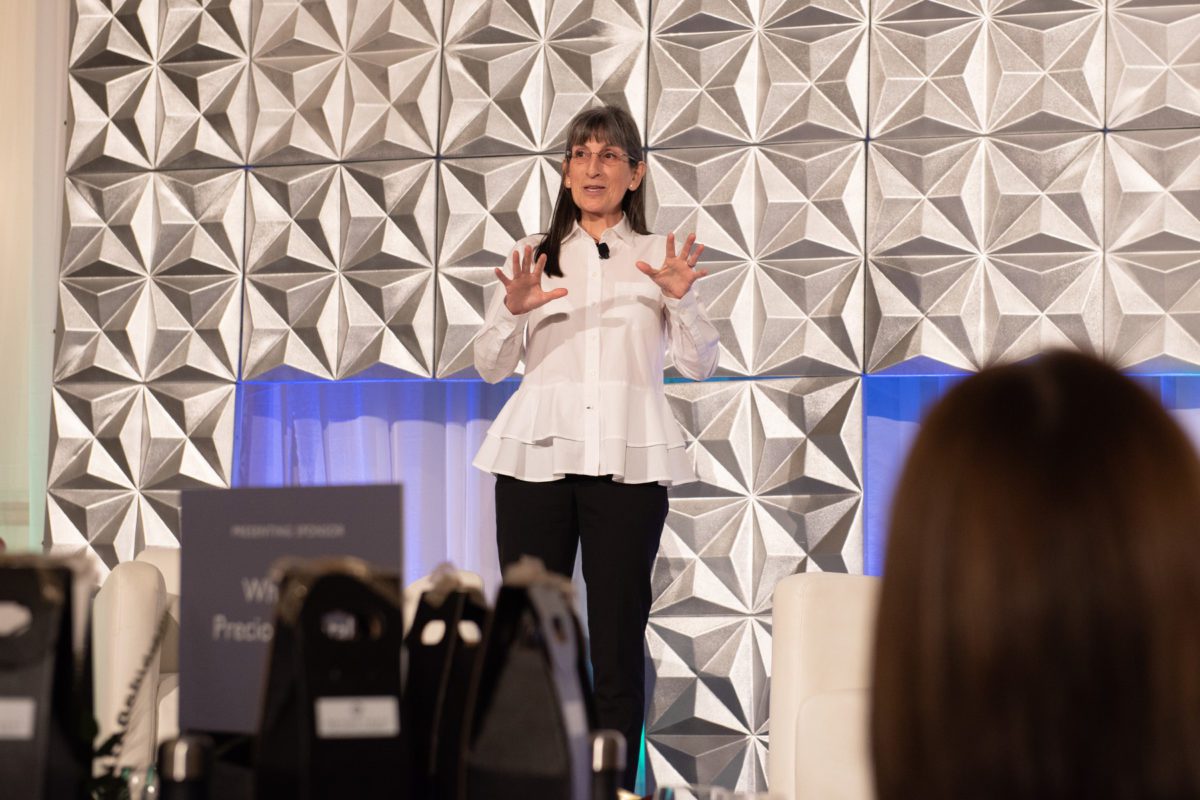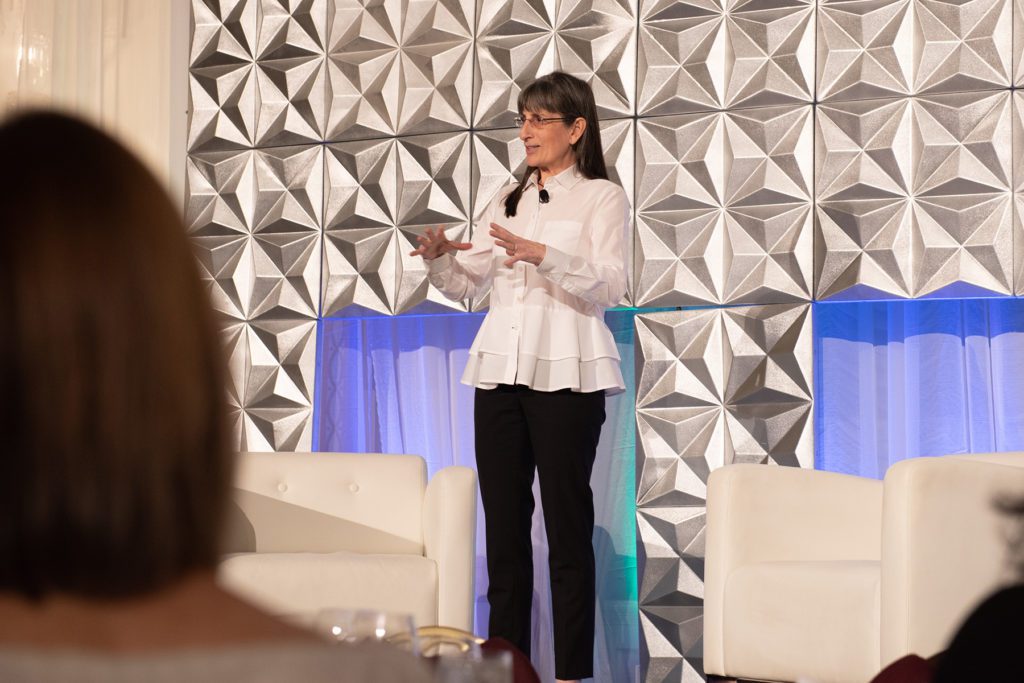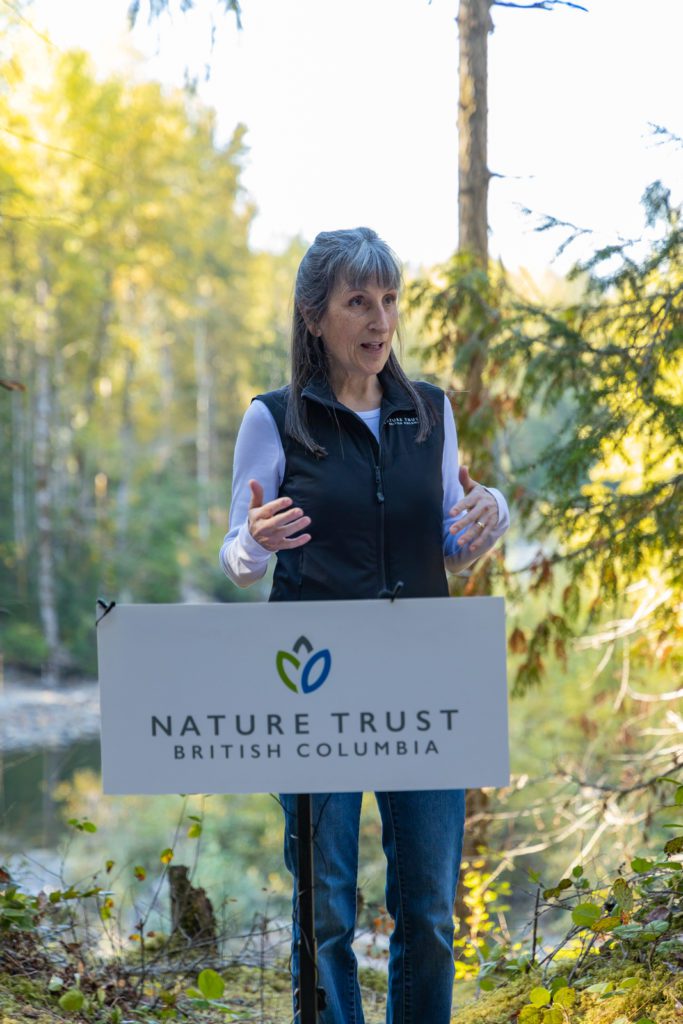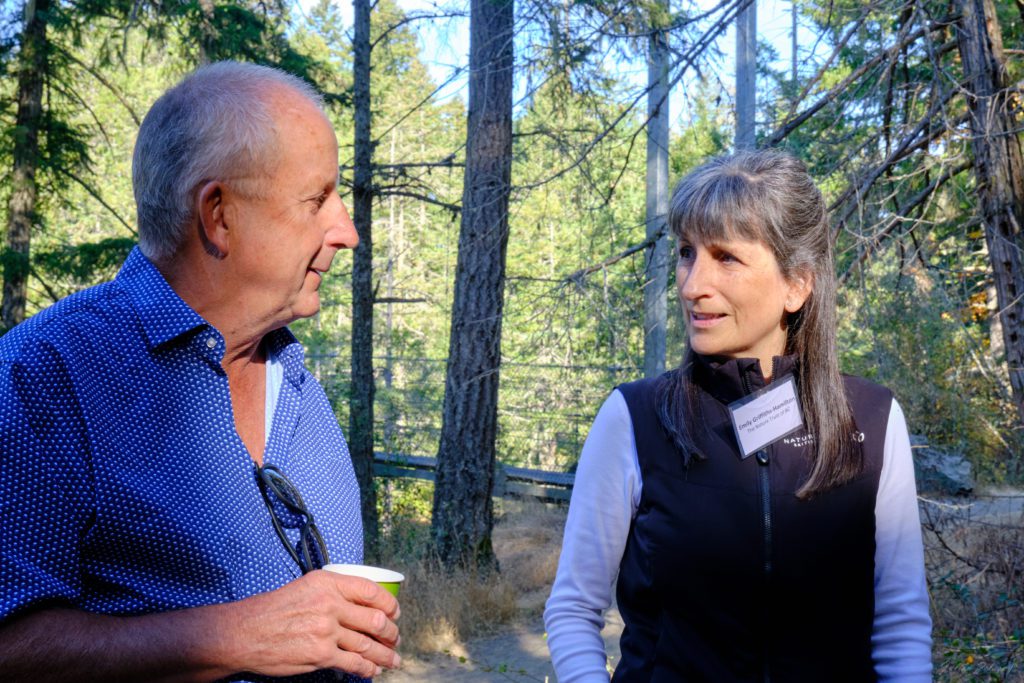
Emily Griffiths-Hamilton knows the importance of keeping an eye on the future. A chartered account, licensed investment advisor and conflict resolution coach, she also brings three generations of experience in long range planning to her work guiding family enterprises in transition.
And Emily brings the same forward thinking to her role as Chair of the volunteer Board of Directors of The Nature Trust of British Columbia where she draws on her experience as owner and former director of Orca Bay Sports and Entertainment, BCTV, CKNW and General Motors Place as well as her commitment to community. She served as Director of The Boys and Girls Clubs of South Coast B.C., as a member of West Vancouver’s Finance Commission and as past Chair of Simon Fraser University’s Foundation Board.
She recently sat down with The Nature Trust of BC to share her unique perspective on what she believes gives The Nature Trust its superpower; why planning 50 to 100 years out is essential and why she has hope for land conservation and its role in mitigating climate change.

What was it about The Nature Trust of BC that attracted you to volunteer your time and accept the role of Chair?
Some things that we deal with in our society will never be solved but the work we do in land conservation today will help to solve tomorrow’s problems.
I’m also old enough to have seen the rapid changes and losses. We can choose to look at them and be sad that they are coming fast and furious now or we can do what we do at The Nature Trust, we can flip the script and we can say, “We can take steps today to make a better future.”
The Nature Trust has been working quietly and tirelessly for five decades to conserve 500 properties and almost 180,000 acres of land in B.C. I didn’t even know it existed when I was first approached or I would have gotten more involved. I think I was approached because of my experience in governance planning and business as a chartered accountant and a licensed investment advisor. The Nature Trust of BC board is very proactive in being diverse and in seeking those with experience on not-for-profit boards. Our Board of Directors is led by sound science and sound business, it is always thinking 50 to 100 years ahead.
What role does nature play in your life?
Nature is really important to me personally. I live on the North Shore and on the Sunshine Coast and I’m in the bush hiking every single morning. There’s lots of research about how being in nature, being in the woods surrounded by trees, contributes to mental health. It’s Important to have the space in your brain to pause the noise.
A question I often ask my clients is, “What brings you joy?” For me, walking in the woods and seeing a butterfly cross my path gives me pure joy and a sense of wonder, hope and happiness.
The license plates on our cars say Beautiful B.C. and those words have always resonated with me. Our beauty has so many layers to it and one of those is absolutely our environment. What people call biodiversity to me are the trees, the forests, the waterways, the animals, and the birds – all those things that light us up.
Stewardship plays an important role in family business transitions. What role does stewardship play in in the work of The Nature Trust?
When I think about stewardship and The Nature Trust, I think, do we look at our natural environment as something more akin to a lottery win or an heirloom?
If you think of a lottery win you think of something you’re happy to get your hands on and spend. Later you might wish you’d thought more long term – 10, 20 or 50 years ahead.
But what if you saw our natural environment as an heirloom? Then you would think of a treasured item you hold in your hands. For The Nature Trust that would be the properties we’ve protected that have the greatest benefit for conservation to the province of British Columbia.
So stewardship is about inheritance. Because if nature is an heirloom then it’s something we must treasure; that we hold in our hands and think deeply about, not just for today but how we’re stewarding and managing it to pass on to future generations.
That’s the emotional side of stewardship. But stewardship also connects to my practical business side. Conservation is critical but we clearly can’t do what we do without the financial stewardship that this organization has at its foundation.
The financials in an organization are like oxygen in human life – it’s not the point of human life but we can’t live without it. In an organization, financials are not the whole point, but they are essential or we can’t survive.
The Nature Trust is rigorous, thoughtful and very focused on long-term thinking so our business model is based on the things that we say we’re going to do 10, 50, and 100 years out.

The Nature Trust has accelerated its land acquisition efforts to protect more critical habitats but the land costs are also accelerating. How do you encourage donations?
The level of commitment to land conservation is more than a matter of the size of the donation. Ten dollars 10 times does start to make a difference, every dollar counts; its cumulative. But a donation to The Nature Trust can also be seen as a recognition of the work we’re doing. The more we reach people’s hearts and minds, the more we open other doors. We want everyone to know about The Nature Trust and the land conservation work we’re doing in this province.
The fact that many of the nearly 180,000 acres The Nature Trust protects are in remote B.C. locations may be a reason people are unaware of the extent of its land conservation achievements.
I agree. Before COVID 19, our Board visited many of these remote properties in different regions and while it was incredibly powerful, I learned you don’t need to see or be on these properties to understand how important they are.
The Nature Trust is focused on protecting habitats by acquiring private land that has conservation values that will make a difference. These vulnerable properties cover only a small percentage of land in the whole province leaving lots of other areas to ride bikes and take dogs off leash without disturbing these treasured heirlooms that make such a difference to keeping nature in our future.
Nature-based solutions to climate change are in the spotlight. Do you think there’s a greater understanding of the importance of land conservation?
Yes, in fact some municipalities are putting the value of their natural assets like wetlands in their financial statements. We must treasure our natural assets. What gets measured matters. It’s also another avenue into the hearts and minds of people.
What are some of the challenges facing land conservation today?
We need a shift in education. We need more people to learn about the importance of land conservation and certainly more about what The Nature Trust does. Our work is just a tiny component of the big picture but one of our many super powers is that we partner with communities, with our donors and with other organizations. We know that no one organization can do this work alone. We embrace partnerships because the more quality voices we have the more quality decisions will be made.
We recognize that B.C. is big and as much biodiversity we have, we also have diversity in people and communities. What’s important to us in the city is very different from what’s important to someone living in a rural area. So we are very respectful and lean in and listen to every community in the province and work with those communities. That is a super power of The Nature Trust.
The challenge is that our population is growing quickly so how do we help people understand at an earlier age what it is has taken me several decades to learn.
Do you think the younger generation has a greater understanding of the importance of land conservation?
One hundred per cent! My own family is a good example. One of my sons is a registered professional forester and consults with firms all over B.C. He’s currently pursuing his PhD in Forestry at Oregon State University.
Both my sons are outdoor people who grew up hiking with me. They say they learned from me to take the hard route down.
Are you hopeful about land conservation and its role in climate change?
I believe there’s hope. It’s the only way to think. Not believing in hope would make us stop doing what we’re doing. And that’s of no value. We know we’re not necessarily going to see the benefits of the work we’re doing today. We’re not doing it for ourselves or even for our kids, we’re doing it for the ones coming up after that. And that’s where hope comes in. We get to write the script – one that’s positive, that’s optimistic. We’re going to be the change that’s needed.

There seems to be a passion and commitment that goes hand in hand with land conservation work in this province.
Yes, and I wonder if it’s because everyone here has a connection to nature. It allows us to take a pause and to think about the future instead of the next minute.
Our natural world is changing quickly so we need to do something now for the future. We can’t save everything but we can try to save the land that needs to be saved.
What would you like to accomplish during your term as Board Chair of the Nature Trust of BC?
This is a role I evolved into and hopefully when I’ve left there’s an even stronger financial culture. It’s a business. We’re in the business of conserving properties not making money. I don’t want to disrupt that. I want to stay laser focused on raising funds so that we can continue to do what we do – to not lose site that our model is not about today or even five years out but that we keep looking 50 and 100 years out. That while we keep making those big decisions we’re making sure that we have the financial model that meets our needs so that we’re conserving the right properties.
We are really unique. Not a lot of businesses are focused on a future 50 and 100 years out. Sometimes it’s a challenge to not focus on today or this quarter and this meeting – it’s an unusual thing which to me is an incredible opportunity.
This organization is on the cusp of continued stewardship both financial and conservation-wise to be in an incredibly powerful conservation position.
